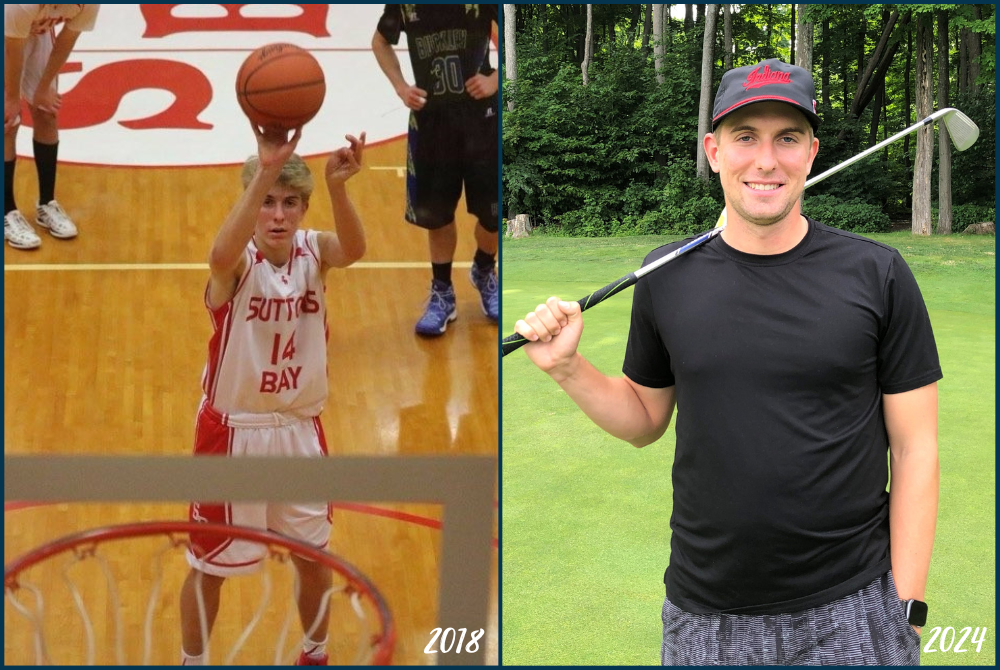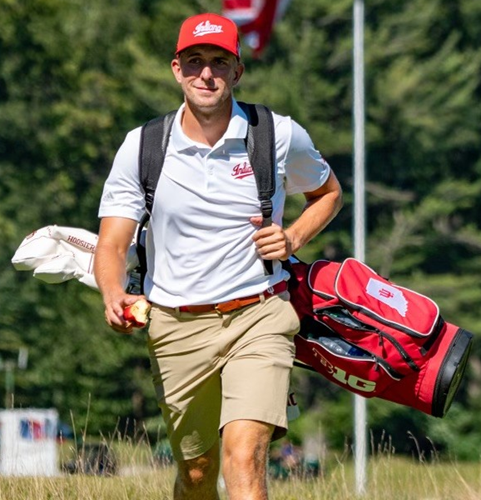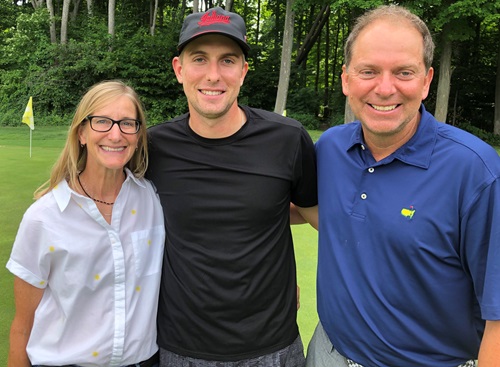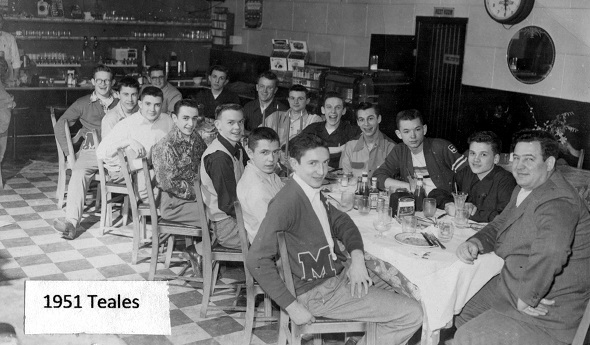
After Successful 'Sequel,' Suttons Bay's Hursey Embarking on Next Chapter
By
Tom Spencer
Special for MHSAA.com
July 30, 2024
Thomas Hursey’s story is a Hollywood writer’s dream. He really is the stuff of sequels.
 He could star in a remake of “Hoosiers” – titled in the singular as just “The Hoosier” – or maybe “Against All Odds II” is more fitting.
He could star in a remake of “Hoosiers” – titled in the singular as just “The Hoosier” – or maybe “Against All Odds II” is more fitting.
Hursey is a 2018 graduate of Suttons Bay High School. He was in a class of just 30 students. He grew up where there is snow on the ground, many argue, for six months of the year. He never played an Amateur Junior Golf Association tournament. And, he had zero scholarship offers from Division I colleges.
To top it off, basketball was his favorite sport in high school. It still is today.
Hursey, who admits he pretty much hated golf, switched his focus from the basketball court to the links midway through high school. He gave up on playing college basketball despite scoring 1,200 points during his career and achieving all-state status.
As a high school freshman, he helped a team comprised of only senior teammates win the Lower Peninsula Division 4 golf championship. He earned all-state in golf too and did receive a scholarship offer from Division II Ferris State University. He took it and excelled there.
So maybe his movie would be titled “The Bulldog.” Again, as a freshman at FSU, he had only senior teammates – and he was named Great Lakes Intercollegiate Athletic Conference Freshman of the Year.
Hursey went on to pick up individual titles and conference player of the year awards as he led the Bulldogs to GLIAC championships and trips to the NCAA Division II Tournament.
Today, many say Hursey could make a run at the PGA Tour – and they may wonder why he doesn’t. Instead, he is about to join a Philadelphia-based pharmaceutical company and put his science and business background to work.
He has a biology degree from Ferris and a master’s in business from Indiana University. He has no interest in playing an individual sport after his stellar high school team sports career at Suttons Bay. His preference is to work hard with teammates and relish a leadership role similar to the one he had playing for the Norsemen in golf, basketball and tennis and while running cross country.
“I am much more of a team-sport guy,” Hursey explained. “I can’t really get the same motivation when it’s just an individual tournament – I need to be surrounded by team.”
Unlike most Big Ten golfers, professional golf was never really on Hursey‘s mind. Veteran IU golf coach Mike Mayer believes Hursey is capable of continuing his golf career, but respects his decision to take another path.

“Thomas was a gift to us,” Mayer said. “Very truthfully, Thomas Hursey might very well be at the top of the list as a great athlete, and great golfer, but more importantly a great person.
“I have had a lot of great student-athletes and you don’t rank them, but at the same time you know which ones stand out,” Mayer continued. “And Thomas Hursey simply stands out.”
Hursey’s parents are former college athletes, retired teachers and longtime high school sports coaches. His father Todd was his high school coach and is now the golf coach at Traverse City West. His mother Nicki was the Suttons Bay softball coach and coached siblings Laura and Jane on the softball field, where they became all-staters as well. Jane, a 2015 Suttons Bay graduate, was also an all-state basketball player. Laura, a 2020 grad, also starred in volleyball.
Thomas Hursey had a reputation as a nice competitor, and his parents treasure that even more than the success he found in high school and college sports.
“I always, and so did Todd, looked out more and hounded him be humble more than anything,” Nicki said. “He had talent and God-given gifts, but what made me so proud was just the way he acted on the course and the number of parents that come up to me and say what a wonderful son you have.”
Mayer, too, proudly recalls Thomas’ politeness and humility.
“As a coach, that’s at least as equally, if not more than rewarding than winning,” he said.
Mayer admits he secretly wishes Hursey would try pursuing professional golf, but respects his decision to end his golf career while it was still a team sport.
“Thomas Hursey has the athletic ability to play professional golf,” Mayer confirmed. “I fully understand his decision – he is going to be successful in whatever he chooses to do.”
Hursey had four top-20 and two top-10 outings for IU during his last season, including an 18th place finish at the Big Ten Championship. During his career at IU, Hursey was named a Big Ten Distinguished Scholar, a Big Ten Sportsmanship Honoree and to the academic all-Big Ten team.
Hursey’s first love was basketball. He’s a fan of the Indiana Hoosiers program and became quite familiar over the years with Michigan State University coach Tom Izzo and his son, Steven.
 The Izzo connection started when Michigan State was recruiting Dwaun Anderson, a Suttons Bay graduate and the Mr. Basketball Award winner in 2011.
The Izzo connection started when Michigan State was recruiting Dwaun Anderson, a Suttons Bay graduate and the Mr. Basketball Award winner in 2011.
Hursey recalls all the hardest practices in basketball as he hoped to someday play at the college level. He had a tremendous work ethic on the court, and it helped his transition to golf.
Even though golf is the most difficult sport he’s taken on, Hursey mastered it more easily because of his desire to get better and not let anything get in the way of success.
“The chip on my shoulder – the grit I had – I think that helped me get to the next level in golf,” Hursey noted. “I really never felt I was as good as I was – I still don’t think I am.
“People tell me I’m good at golf, and I just don’t believe that because I just have this hunger to get better,” Hursey continued. “I am my biggest critic.”
Hursey quickly added he benefitted from two other critics – his sisters. He’s admitted he believes they possess more athleticism than he does.
“They always pushed me to get better, and they always pushed me to work harder,” he said. “They are kind of no-nonsense people.
“Growing up I never got more encouragement from them as much as I did critiquing,” he continued. “That was huge in terms of molding me.”
Hursey’s accomplishments are not at the top of the minds of his parents and former athletic director.
“I always say I am excited about the things he accomplished, but I am proud of the way he is as a person,” Todd Hursey said. “I am proud of how he is and how he handled himself.”
Retired Suttons Bay athletics director, Doug Periard agrees. He watched Hursey’s work ethic develop early and found him regularly at open gyms. Periard also singled out Hursey’s sportsmanship.
“I cannot think of a discouraging word the young man ever said to a teammate or opponent,” Periard said. “He was able to demonstrate both sportsmanship and leadership in defeat, and also in victory.”
2024 Made In Michigan
July 24: East Kentwood Run Part of Memorable Start on Knuble's Way to NHL, Olympics - Read
July 22: Monroe High Memories Remain Rich for Michigan's 1987 Mr. Baseball - Read
July 17: Record-Setting Viney Gained Lifelong Confidence at Marine City - Read
July 11: High School 'Hoop Squad' Close to Heart as Hughes Continues Coaching Climb - Read
July 10: Nightingale Embarking on 1st Season as College Football Head Coach - Read
June 28: E-TC's Witt Bulldozing Path from Small Town to Football's Biggest Stage - Read
PHOTOS (Top) At left, Suttons Bay's Thomas Hursey prepares to shoot a free throw during his senior season, and at right Hursey remains at home on the golf course. (Middle) Hursey grabs a quick snack during a round while golfing for Indiana. (Below) Hursey, recently, with his parents Nicki and Todd. (Recent photos by Tom Spencer; Indiana and Suttons Bay photos courtesy of the Hursey family.)

Data Dig Continues for Hoops Histories
March 7, 2017
By Ron Pesch
Special for Second Half
There is a list – well actually two – that sit, unfinished, among the “1,001 Projects I’d Like to Complete Before I Die.”
I became the caretaker of these lists back when I inherited the title “Historian for the MHSAA” in 1993.
The original lists contained the scores of all MHSAA Quarterfinal, Semifinal and Final round games for the MHSAA boys and girls basketball tournaments since their origin.
From the 1930s into the late 1960s, the MHSAA tournament game-day program was generally nothing more than a single sheet document, containing tournament brackets and team rosters for the qualifiers.
 In 1969, the program saw a redesign by Lansing sports personality Tim Staudt and premiered at the MHSAA Tournament. Sold for 50 cents, it included a list of “Past Michigan State Champions” containing the names of the winning teams and those schools’ basketball coaches for each of the four classes. The publication also included a couple of articles from Dick Kishpaugh, the author of the champions list. Kishpaugh was identified as “Sports Information Director at Kalamazoo College and … perhaps the most knowledgeable historian on Michigan high school basketball.”
In 1969, the program saw a redesign by Lansing sports personality Tim Staudt and premiered at the MHSAA Tournament. Sold for 50 cents, it included a list of “Past Michigan State Champions” containing the names of the winning teams and those schools’ basketball coaches for each of the four classes. The publication also included a couple of articles from Dick Kishpaugh, the author of the champions list. Kishpaugh was identified as “Sports Information Director at Kalamazoo College and … perhaps the most knowledgeable historian on Michigan high school basketball.”
With the start of the Girls Basketball Tournament in 1973, a similar program design was followed.
Those lists were faithfully updated and published in the game-day programs in the same format until the 1987-88 school year, when the souvenir publications were expanded. For the first time, a list containing opponents and final scores of the boys and girls championship games was now available to the general public.
Among the first tasks I chose to approach when I assumed the duties of MHSAA historian was to chase more information.
Since Kishpaugh’s lists had game scores for the three final rounds of the tournament, and names of the championship coaches, I thought I would try to leave my mark. I began chasing down the names of coaches for the runner-up, as well as final win-loss records for both schools. And while I was at it, I decided to see what I could find for teams that made the Quarterfinals and Semifinals.
Hundreds of hours have gone into adding to and maintaining the lists, and much progress has been made. Yet, some 20+ years later, I’m still trying to fill holes in the data.
The Basketball Coaches Association of Michigan helped spread the word, notifying its membership of the project. Web pages were created for both the boys and girls to show teams still missing information.
 The pursuit has led to friendships, and fascinating stories, documents and images. The late Walter Michael, who had attended the MHSAA Finals for more than 60 years, donated a cache of MHSAA tournament programs from the 1940s through the 1960s that filled in the names of many high school coaches. Del Newell, a sports writer from the Kalamazoo Gazette, knocked out most of the Kalamazoo schools early in my search. Bill Khan, then of the Flint Journal sports department, filled in a large number of missing names and records from the Flint area. The recently retired “Son of Swami,” better known as Mick McCabe, contributed by including the win-loss records of the quarterfinalists in his annual tournament prognostication columns for the Detroit Free Press.
The pursuit has led to friendships, and fascinating stories, documents and images. The late Walter Michael, who had attended the MHSAA Finals for more than 60 years, donated a cache of MHSAA tournament programs from the 1940s through the 1960s that filled in the names of many high school coaches. Del Newell, a sports writer from the Kalamazoo Gazette, knocked out most of the Kalamazoo schools early in my search. Bill Khan, then of the Flint Journal sports department, filled in a large number of missing names and records from the Flint area. The recently retired “Son of Swami,” better known as Mick McCabe, contributed by including the win-loss records of the quarterfinalists in his annual tournament prognostication columns for the Detroit Free Press.
Numerous coaches around the state sent e-mails and letters with the names and records for their predecessors. Prep basketball fans and former players sent along offerings. Rob Madsen from Mt. Pleasant became a huge contributor, and sent regular updates to both lists. He focused on some of the state’s smallest schools, including many from the Upper Peninsula.
Leon Westover sent the win-loss record for little Marlette, 1951 Class C runner-up, as well as one of my favorite photos from that golden era of prep sports. Marlette had “waltzed through the Mid-Thumb League and district, regional and quarter-final tournament games,” wrote Fred J. Vincent of the Port Huron Times-Herald. Marlette slipped past Stanton 41-37 to advance to the Class C title game against unbeaten Detroit St. Andrew.
“Just one game too many …,” continued Vincent, writing from East Lansing’s Jenison Field House following the title game. “That just about explains the one-sided beating Marlette absorbed in the state class C high school basketball final here Saturday afternoon. The final score was 52-26. … One of the smallest teams, physically, in the tournament, it seemed that the Raiders were just worn out.”
Yet, that night, the team was celebrated like the hometown heroes they really were.
 Westover’s photo shows the Red Raiders on the night of the Final, gathered at Teale’s Restaurant in Marlette. The clock indicates its 11:30. The owner, George Teale, has opened up his restaurant for the team to cook them steaks in honor of their achievement. Coach Nieland "Tommy" Thompson and his 22-2 squad look happy, ready to celebrate a long season.
Westover’s photo shows the Red Raiders on the night of the Final, gathered at Teale’s Restaurant in Marlette. The clock indicates its 11:30. The owner, George Teale, has opened up his restaurant for the team to cook them steaks in honor of their achievement. Coach Nieland "Tommy" Thompson and his 22-2 squad look happy, ready to celebrate a long season.
At tournament time, these lists help answer media requests that arise.
Question: When was the last time two undefeated teams met for an MHSAA Finals championship?
Answer: 2003-Class A for the girls. Detroit Martin Luther King topped Flint Northern 58-53. 1971-Class C for the boys. Shelby downed Stockbridge 71-57.
Question: What coach had the longest span between championship game appearances?
Answer: Eddie Powers, coach of Detroit Northern, went 34 years between his Class A championship team in 1930 and his runner-up squad in 1964. The mark is asterisked, however, as the Detroit Public School League chose to stop participation in the annual state tournament from 1931 through 1961. Saginaw’s Larry Laeding went 20 years between winning the 1942 Class A championship and his squad’s 1962 Class A title. Maple City Glen Lake coach Don Miller went 19 seasons between the school’s 1977 Class D title and its 1996 runner-up finish, also in Class D.
For the girls, both Mary Cicerone at Bloomfield Hills Marian and Carl Wayer at Ashley went 16 seasons between appearances. While Cicerone’s Marian teams have made seven visits to the Finals and have won six Class A titles, 16 years elapsed between Marian’s 1998 and 2014 Class A championships. Marian then captured a second consecutive title in 2015. Coach Wayer advance two teams to the title game. Ashley finished as runner-up in Class D in 1980 and again in Class D in 1996. The loss in 1996 came in overtime, and was the only defeat for Ashley that season.
Michigan’s high school basketball tournaments are an experience shared, mostly unchanged, since their beginnings. At the end of the regular season, everyone qualifies for the madness. Yet in the end, only four teams finish as champions. The path mimics the magical trail taken by fathers, grandfathers and great grandfathers, mothers and grandmothers. Qualifying for the Quarterfinals is still a huge triumph, as the round brings together only 32 teams from a field of more than 700 boys teams and more than 650 girls teams.
In my eyes, these lists emphasize that remarkable, undiluted achievement. In a world consumed with trophies and the number “1,” perhaps it is time to step back and celebrate this rare journey.
Click for Ron Pesch's data "Needs Lists" for girls basketball and boys basketball.
 Ron Pesch has taken an active role in researching the history of MHSAA events since 1985 and began writing for MHSAA Finals programs in 1986, adding additional features and "flashbacks" in 1992. He inherited the title of MHSAA historian from the late Dick Kishpaugh following the 1993-94 school year, and resides in Muskegon. Contact him at [email protected] with ideas for historical articles.
Ron Pesch has taken an active role in researching the history of MHSAA events since 1985 and began writing for MHSAA Finals programs in 1986, adding additional features and "flashbacks" in 1992. He inherited the title of MHSAA historian from the late Dick Kishpaugh following the 1993-94 school year, and resides in Muskegon. Contact him at [email protected] with ideas for historical articles.
PHOTOS: (Top) Marlette's 1951 boys basketball team gathers for dinner at a local restaurant after the Class C Final. (Middle top) The 1969 Boys Finals saw the addition of updated tournament programs. (Middle below) The 1977 Girls Finals program told of the teams that would meet at Jenison Field House. (Below) The 1947 Boys Finals program was among many that helped fill in data gaps from the early years of the tournament. (Photos provided by Ron Pesch.)

